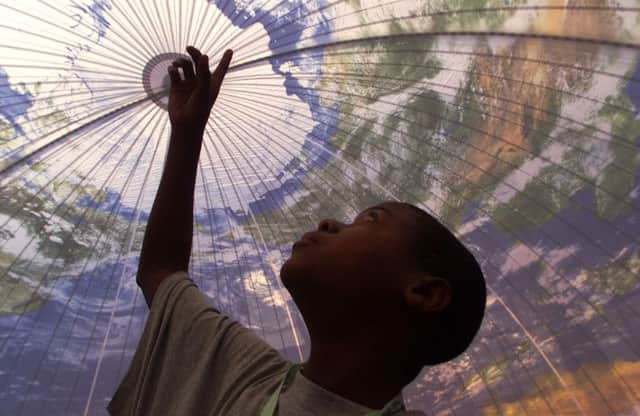Sustainable growth must include more than economic prosperity


EVERY species must exploit its environment to survive and evolve. It has to have food and places to live, using the natural resources around itself. If the resources cannot be sustained, or replaced by alternatives, extinction is the result. This is a fundamental law of biology.
Humans as a species “develop” by following our desire to make things better for ourselves within the biosphere of our planet.
Advertisement
Hide AdAdvertisement
Hide AdAs a species, we possess a well-developed memory, individually and socially. This is one reason for our comparative “success”. We are adaptable. Our extraordinary collective memory has allowed us to find new ways to exploit the resources around us. It has allowed us to become more ubiquitous, and dominant. We have colonised virtually every corner of the planet – and the intensity of our use of resources has grown exponentially.
But resources still need to be sustainable for our survival – and in the late 20th century, our observations of the relationship between ourselves and our sources of sustenance led to questions. Had our population grown too large? What were the long-term effects of our wastes? Were the sources of sustenance great enough?
Evidence emerged of the increasing extinction of other species around us. Worries grew about the loss of entire habitats to human development. Waste products from our use of fossilised carbon as fuel began to affect the climate. The stable climate, which is the very foundation for our “success” – our civilisation – is now threatened.
But only a limited consensus exists around this understanding. Some believe that we can just carry on in exactly the same way as always, and continue to exploit the resources of the biosphere with no regard to the consequences.
This debate has been global, and the United Nations overwhelmingly favours applying precautionary principles to our patterns of development. Since the Brundtland Report and the Rio de Janiero Earth Summit, broad agreement has emerged that our economic development should be socially just and respect environmental limits.
Governments are fearful though, of taking the radical steps required to change the patterns and pace of economic and social development. Our establishment seem trapped into thinking that only infinite economic growth can be accounted as “success”, and that stability would be a failure. Many disregard the evidence that the economy is based on finite natural resources.
Scotland is at the heart of this debate, with researchers looking into the environmental limits of the natural world and adapting to living within them, but in the field of politics and economics, we try to straddle the division. The dominant mantra of our government has become “sustainable economic growth”, but what does that really mean?
Relentless pursuit of increasing GDP is the orthodox position, but does sticking the word “sustainable” in front of “economic growth” mean we have become respecters of environmental limits? “Sustainable” is a wonderfully flexible word and is used to imply environmental awareness, but in its ordinary meaning it can just mean economic growth that is sustained.
Advertisement
Hide AdAdvertisement
Hide AdSo is the circle of the debate squared by the use of a semantic trick? “Sustainable development” is about all forms of development – economic, social and environmental. Growth may or may not play a part in all of this development. “Sustainable economic growth” is, on the other hand, fundamentally about economic growth. Sticking the word sustainable in front of it can’t disguise the difference. You can sustain economic growth all you want, but if it’s not within safe environmental limits it is, by definition, not sustainable development.
In Scotland’s Sustainable Housing Strategy, Holyrood buys into the Brundtland definition of sustainable development. The economic, social and environmental factors are carefully assessed and balanced. In the environmental field, legislation and strategies are littered with sustainable development duties. But in the field of economics, our government continues to champion economic growth. It was strong-armed through Parliament as a duty in the Regulatory Reform Act, and causes confusion and muddle within the planning guidance and the National Marine Plan.
Fortunately, there exists a brilliant opportunity to untangle this mess. The updating of the government’s National Performance Framework offers a way forward. It continues the laudable job of offering a comprehensive and integrated policy framework for Scotland – and offers the opportunity to spell out that our development must be genuinely sustainable, with economic growth accommodated within this framework.
This is why Scottish Environment LINK launched our briefing paper Revising Scotland’s National Performance Framework. It reflects the growing awareness that focusing on GDP alone is too narrow, and that measures of economic, social and environmental progress together, provide a much better measure of Scotland’s success and well-being.
If Scotland can achieve this trick and genuinely dedicate itself to sustainable development, it will thoroughly deserve the “world leading” tag which our politicians like so much.
• Deborah Long is convener of Scottish Environment LINK www.scotlink.org
SEE ALSO